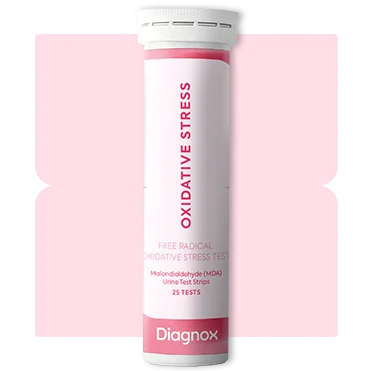How Do You Know If You Have Oxidative Stress?
Since oxidative stress doesn’t come with obvious symptoms, most people don’t even know it’s happening. But here’s a way to find out.
You can measure oxidative stress using simple, non-invasive urine tests. These tests detect certain markers like nitrates, nitrites, 8-OHdG, and F2-isoprostanes. These indicate whether your body is dealing with higher-than-normal levels of oxidative damage [1-2, 4-7].
At Diagnox, we believe this kind of insight should be easy to access. That’s why we offer innovative at-home tests like Diagnox's Oxidative Stress Test that help you track your health from the inside out. This easy test provides clear answers to help you take charge of your health and make informed choices.
Why This Matters for You
Understanding the difference between oxidative stress and emotional stress puts you in control. It helps you care for both your emotional and cellular health, not just when you’re feeling stressed out, but before damage builds up silently over time [1-2, 4-6].
Here’s what you can do, starting today [3, 5-7]:
- Listen to your body and your mind: Don’t ignore signs of emotional stress.
- Support your body with antioxidants: Your diet and lifestyle choices matter. Eat colorful fruits and veggies, drink water, and cut back on processed foods.
- Prioritize rest: Sleep, unplug, breathe deeply, and take quiet moments. Small habits make a big difference.
- Move daily: Even a short walk or stretch can ease stress and help your body fight cell damage.
- Avoid toxins when you can: Choose clean products, fresh air, and avoid smoke to lower your oxidative stress.
- Test your oxidative stress: A simple urine test can monitor your cellular health before symptoms appear and detect potential health issues early.
Bottom Line
Emotional stress is the pressure you feel, while oxidative stress is the pressure your cells feel. One is psychological, the other is biological, but they’re both connected.
With the right tools and information, you can manage both by measuring oxidative stress. You don’t have to wait until something feels “off.” Combine Diagnox’s Oxidative Stress test kits with the proper knowledge to stay one step ahead of your health.







.jpg)





